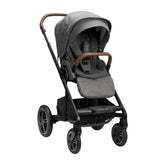10 of the Most Common Early Signs You Might Be Pregnant

Updated 19 Dec 2024
Think you might be pregnant? Many people have an inkling before they even take a test. Some of the early symptoms of pregnancy actually mimic those that happen just prior to a period, making it difficult to tell the difference. While a home pregnancy test (with results verified by a physician) is the only way to be sure you’re expecting, there are early signs that may indicate a baby is on the way.
When Do Pregnancy Symptoms Start? Are There Early Signs of Pregnancy Before a Missed Period?
Like all medical conditions, different people have different experiences. Some people may not feel any symptoms for several weeks, while others never feel any symptoms at all. Certain symptoms, like aversions to certain smells or breast sensitivity, may appear only a few days after conception before you even miss a period. Other symptoms, like implantation bleeding, may arise a week or so after conception.
Common Early Signs of Pregnancy
The most typical and noticeable early sign of pregnancy is a missed period. Conception triggers the body to release hormones that halt ovulation and menstruation. This means a period won’t happen again until after the baby has been born. That said, missed periods aren’t always indicative of pregnancy. Dieting, extreme exercise, stress, and other issues may also cause irregular or missed periods.
Other very early common signs of pregnancy may include the following:
1. Elevated body temperature
A sustained increase in basal body temperature for up to 18 days or longer after ovulation may be a sign of pregnancy. Your body’s core temperature may also rise more easily with exercise or during warm weather. During this time, stay hydrated and exercise with caution.
2. Swollen, tender, or tingling breasts
Early in pregnancy, hormonal shifts cause your body to begin preparing for milk production. Your areolas (the circles around your nipples) will likely get darker and larger. You’ll also start seeing tiny goosebumps appear around your areolas (known as Montgomery's tubercles). The bumps produce oils that help lubricate your nipples once your newborn begins breastfeeding. These changes may make your breasts sensitive and sore. The pain will likely go away after a few weeks as your body adjusts to the changes.
3. Frequent urination
In the early days and weeks following conception, you may notice you’re making more frequent trips to the bathroom. This is due to the increased blood flow to your kidneys and the processing and removal of extra waste (which leaves your body as urine). Eventually, your expanding womb will also begin putting extra pressure on your bladder, leaving less room for urine storage and making bathroom runs even more regular.
4. Feeling tired
Extreme fatigue is another common early pregnancy symptom due to elevated progesterone levels. This improves during the second trimester but returns for many people during the last three months of pregnancy. Try to get as much rest as possible during the early weeks of pregnancy. Adjusting your bedroom thermostat to be cooler may help, as your body temperature may be higher during the early stages of pregnancy.
5. Nausea and vomiting
Morning sickness, which can happen at any time of the day or night, usually starts a month or two after conception. However, some people experience nausea sooner and others never feel it at all. It may or may not be accompanied by vomiting. Extreme vomiting and nausea, a condition known as hyperemesis gravidarum, can become a problem if it leads to dehydration.
To combat nausea, keep a package of saltine crackers next to your bed and eat a few before you get up in the morning to help settle your stomach. Drink plenty of water to stay hydrated.

Less Common Hidden Pregnancy Signs
There are other signs of early pregnancy that are also normal but less common. Some people experience them, while others never do. These symptoms may include:
6. Implantation bleeding
While spotting during pregnancy can be scary, it’s not necessarily an indication that anything is wrong. Around one to two weeks after conception, some people experience light bleeding (known as implantation bleeding) and mild menstrual-like cramping when the fertilized egg attaches to the uterus.
Implantation bleeding occurs just before the time a person’s period would typically start, causing some people to think they’ve only had a light period and aren’t pregnant. Implantation bleeding differs in that it’s typically light pink or brown, not bright red like a normal period. It’s also much lighter and less steady than a regular period, lasting only a few hours or days.
7. Food aversions and cravings and smell sensitivity
When you're pregnant, your sense of taste and smell may go on high alert – and may change completely. Some people are hungry constantly and have very specific food urges. Others begin to dislike things they previously enjoyed.
Many women also experience either an increased or decreased sense of smell during pregnancy, according to 2017 research. This is especially typical during the first and last trimesters. Increased smell sensitivity is more common than lessened smell. Some odors that never troubled you before may become less pleasant or even trigger nausea.
8. Moodiness
As your hormones continue to shift, you could experience mood swings. Some people experience more extreme ups and downs, while others fluctuate between periods of happiness and anxiety or depression. This is normal and can happen throughout pregnancy. If you’re struggling or have considered harming yourself, it’s important to reach out to your healthcare provider for assistance.
9. Nasal congestion
Rising hormone levels and increased blood production can affect the mucous membranes in your nose, causing them to swell, dry out, and bleed easily. This might cause you to have a stuffy or runny nose.
10. Bloating
Surging hormones right after conception can cause your stomach to feel more bloated and gassy than usual. This can be similar to how you might feel at the start of a menstrual period. Unfortunately, bloating is often followed by constipation. Be sure to consume plenty of fiber to help keep you regular.
When to Take a Pregnancy Test
Home pregnancy tests work by looking for a particular level of human chorionic gonadotrophin (hCG) in your urine. For the most accurate results, wait until your period is about a week late to take a pregnancy test (though you can take a test as soon as you’ve missed a period). Taking the test too early may result in a false negative (the test says you aren’t pregnant, but you are). If you need results sooner, your healthcare provider can do a blood test as soon as seven days before a missed period.
 When to Call Your Doctor
When to Call Your Doctor
If your period is late or you’ve got a positive result with an at-home pregnancy test, contact your healthcare provider to schedule an appointment. You’ll also want to begin taking a prenatal vitamin containing folic acid to ensure healthy neural tube development in the baby.
During your medical appointment, your doctor or midwife will talk with you about any existing medical conditions, in addition to your overall health before pregnancy. This visit is intended to get you into the best position for a healthy pregnancy going forward.
The Takeaway on Classic Early Pregnancy Symptoms
Every person experiences the early symptoms of pregnancy differently. Some symptoms, like fatigue or sore breasts, are common and may be present even before a missed period. Other signs are less typical or never present at all. If you suspect you may be pregnant, take an at-home test to check. These tests are extremely accurate when used correctly. Contact your healthcare provider if your test is positive. Early prenatal care is critical and helps you and your baby stay healthy.









